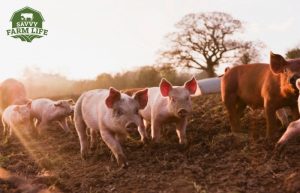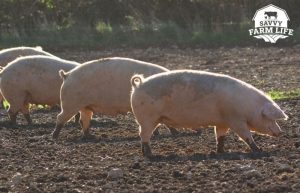
How To Deal With Pigs That Smell Bad
Pigs have a bad reputation when it comes to cleanliness and smell. There is a reason a parent might call a teenager’s bedroom a “pig sty.” If you’re looking to raise pigs, it’s important to be prepared for whatever they may throw your way…including their stench.
Do pigs smell bad? Pigs are hygienic animals and enjoy being clean, and pigs themselves do not stink. However, the hard truth of the matter is that their manure does stink – and arguably more so than other farm animals. Pig manure has compounds in it that causes a significant odor compared to other livestock, and this is true whether your pig lives on your farm or in your home.
So, are there ways to manage the odor your pigs may put off? To learn easily ways to manage pig manure and the stench that comes with it, keep reading!
How to Manage Pig Smell and Manure on a Farm
There are two different areas in which you can help manage the manure smell in your farm pigs – through environmental management and also through your pig’s diet.
You can help minimize the smell on your pig farm by managing the environment effectively. You will want to give your pigs a separate area for sleeping and eating, encouraging them to eliminate in a specific spot. You will also want to keep the manure cleaned up, and keep their pen or pasture as dry as possible. Create a manure pile away from your facilities where you can compost pig waste without dealing with the smell.
Managing Pig Smell: Give Your Pigs The Right Amount Of Space
Pigs are naturally clean animals and desire to eliminate waste in an area in which they are not sleeping or eating. You will want to give your pigs enough space so that they will have room to establish a “toilet corner”. You can encourage this by providing ample, dry bedding for their sleeping shelter, and a separate area for food and water. Make sure that aside from these two areas, there is ample space for your pigs to establish their elimination location.
If your pigs are eliminating in the same relative location, it will make it easier for you to clean up the manure, and contain the smell. This is not a behavior that you should need to teach – because the pig’s natural tendency is toward cleanliness, they do not want manure where they sleep.
While you want to ensure your pigs have enough space so they are not defecating where they are sleeping and eating, some argue that you should also ensure you are not giving your pigs too much space. Giving your pigs too much space will make it more difficult for you to keep their pasture clean of manure, and will spread out the “smell range”. For example, if part of your pasture is near your neighbor’s home, you will want to keep your pigs contained so that they are not leaving waste too close to your neighbors.
Managing Pig Smell: Keep Your Pig Pen Clean
Of course, the number one tip to keeping manure smell down, is to pick up and remove the manure. If you have a small herd of pigs and a manageable space, it may be feasible to pick up the manure daily. You can then either dispose of or compost the manure. If your compost pile is smelly, you can sprinkle lime or activated charcoal on it to absorb the smell, and cover with sawdust, shavings, or straw.
Managing Pig Smell: Keep Your Pig Pen Dry
A wet environment will significantly worsen the smell of manure. Keep your pig’s enclosure or pasture as dry as possible – it can help to grade the land so that there is a 5% slope which will allow for drainage.
Managing Pig Smell: Feed And Supplements
You can also manage the smell of your pig’s manure by changing the protein level and also by offering supplements.
Managing Pig Smell: Adjusting Protein Intake
Adjusting the protein levels in your pig’s diet can have a significant effect on the smell of the manure – specifically, lowering it so that they only get the amount of protein that they need for proper development and growth. Excess protein can significantly increase the level of odors that are released from their manure.
Managing Pig Smell: Offering Supplements
There are supplements that you can provide your pigs to help with the smell of their manure as well. One supplement, called Promax, is a probiotic that has been shown to reduce ammonia in the manure by up to 40%.
How to Manage Pig Smell and Manure in a Home
Perhaps you do not run a large swine operation; instead, you have a pet pig in your home and would like to know how you can reduce the smell from your pet pig’s waste.
Managing Pig Smell: Litter Train Your Pig
 Of course, if your pig lives in your home, you are likely already managing his waste by training him to eliminate either in a litter box or outside. If using a litter box, make sure that you clean it regularly and use a large enough litter box for your pig to grow with. Some use a kiddie pool as a litter box, as a mature pig will be too large to use a traditional litter box. Pigs have a tendency to eat cat litter, so you will need to use another type of litter such as pine litter.
Of course, if your pig lives in your home, you are likely already managing his waste by training him to eliminate either in a litter box or outside. If using a litter box, make sure that you clean it regularly and use a large enough litter box for your pig to grow with. Some use a kiddie pool as a litter box, as a mature pig will be too large to use a traditional litter box. Pigs have a tendency to eat cat litter, so you will need to use another type of litter such as pine litter.
Managing Pig Smell: Neuter or Spay Your Pet Pig
When a pig matures sexually, they will develop new behaviors and odors which you will likely find offensive in your home.
Male pigs reach sexual maturity at around 2 months of age, and at that time you may begin noticing discharge coming from his male parts. This discharge is semen, often mixed with urine, and will produce a foul smell. Your young male pig likely has no control over when this is happening, and will leave this discharge around your home. The way to curb this is by neutering him.
Neutering your pig will prevent this discharge and will also calm him and prevent aggressive behaviors that can accompany sexual maturity. Neutering also has health benefits, mainly the prevention of testicular and prostate cancers.
You will also want to alter your female pig – once she is sexually mature she will go into heat every three weeks or so. When a female goes into heat, she will urinate more often, and she may start urinating outside of her litter box at this time. Pig urine is high in ammonia and will produce a strong smell. Spaying your female pig has the same health benefits as neutering your male – it will prevent cancer in the reproductive organs.
Why Do Pigs Stink?
There are a variety of molecular compounds that make up different types of odors. All manure has a combination of these compounds, however they can vary in degree between different species of livestock. Two of the biggest contributors to the smell of manure are the gases ammonia and hydrogen sulfide – both of which are prevalent in pig manure.
Ammonia
Ammonia is a combination of nitrogen and hydrogen, and is a famously unpleasant smell. This smell comes into play when the gaseous ammonia escapes from the manure, and causes the distinctive ammonia odor.
In the late 1990’s, researchers compared the levels of gaseous ammonia between pig farms, dairy farms, and poultry farms. Based on the size of the operation and housing (as opposed to the size of the animal in question), pig operations produced three times the gaseous ammonia as equivalent poultry barns, and six times the gaseous ammonia as equivalent dairy barns.
Hydrogen Sulfide
Hydrogen sulfide is another gas byproduct of manure, and due to the sulfur, will produce the “rotten egg” smell that most of us are familiar with. Hydrogen Sulfide was studied in the same research as ammonia in the late 1990’s, and pigs again produced significantly more hydrogen sulfide than both poultry and cows – both in size of operation / barn and in size of individual animal.
Bacteria
Bacteria is another factor when it comes to the odor that emanates from manure. The odor that most of us associate with feces of any species (including humans) derives from the byproducts of the bacteria in our digestive systems. These compounds are powerful and are noticeable in very small concentrations. These compounds are also found to significantly affect the smell of pig manure – much more so than in either cows or poultry.
Hygiene aside, pigs likely get their smelly reputation from these compound cocktails that emanate from their manure. While there is no arguing the evidence, all is not lost when it comes to pig smells. The way that you manage your herd will greatly affect the significance of the manure smell and how it will affect you.
Pigs As Pets
Though it can seem like extra work in keeping pig smell at bay, many pig owners will insist that the work is worth the benefits. Pigs make excellent pets and are incredibly intelligent and easy to train. As with any pet (or livestock species), you will want to learn as much as you can about the animal before taking the plunge, so that you can be honest with yourself in determining whether or not this is really the right animal for you and your homestead (or house).
Did you know that pigs can co-exist with chickens? There are even some benefits to keeping these animals together. To learn more, visit my article Can Pigs and Chickens Live Together?
